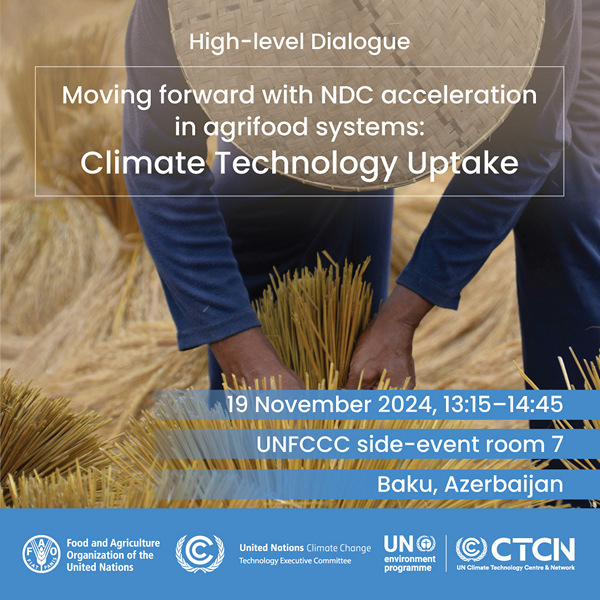High-level Dialogue
Moving forward with NDC acceleration in agrifood systems: Climate Technology Uptake
19 November 2024 | 13:15—14:45 |Baku, Azerbaijan
Room: UNFCCC side-event room 7
Watch the recording here
Background
The global community, as highlighted through the latest CoPs, recognizes the critical role that agrifood systems have to play for effective climate action. The Paris Agreement supports these efforts by promoting climate-resilient development based on low greenhouse gas emissions without compromising food security, and encourages the transfer and dissemination of technology as essential for achieving these goals. However, uptake of climate technologies for climate action in agrifood systems is still sluggish. What are the real reasons for this?
The joint report prepared by FAO and UNFCCC Technology Executive Committee seeks to fill that knowledge gap by exploring how climate technologies can support the transformation needed to sustainably feed the planet and people in the years to come, while supporting equitable growth. The report illustrates how climate technologies are key to supporting agrifood system transformation and NDC implementation going forward and that capacity, finance and social inclusion are essential elements needed to ensure the transition can be achieved. The reports highlights the needs for robust technology assessments to underpin climate technology identification for agrifood systems' transformation that addresses all stages of agrifood value chains, which needs to be supported by capacity building programmes, targeted financing and fed into the ongoing climate policy process. The capacity-building strategy is to support this process, these efforts are to be tied to the technology assessments, and to identify skills gaps, especially for smallholders and vulnerable segments of the population.
The first Global Stocktake highlights the crucial role of technology in advancing climate action under the Paris Agreement. It recognizes the Technology Mechanism's progress, especially through its 2023–2027 joint work programme focusing on technology development, transfer, and capacity-building. Persistent challenges in global technology adoption are identified, urging enhanced cooperation with the private sector to scale up existing technologies and foster innovation. The necessity of predictable financial support and capacity-building for developing countries is addressed. Furthermore, it proposes a new Technology Implementation Programme to strengthen technology priorities identified by developing countries.
Objectives
The high-level event will convene a diverse set of ministers, local and regional leaders, financial institutions, and non-government stakeholders to agree on a suite of multilevel, Paris-aligned actions for cooperation in the UNFCCC space, focused on joint policy and finance for sustainable climate technology uptake in agrifood systems.
Moderator: Salina Abraham, Chief of Staff to CEO, Center for International Forestry and World Agroforestry (CIFOR-ICRAF)
13:15 - 13:30 | Welcoming remarks
- Sarvan Jafarov, Deputy Minister of Agriculture of the Republic of Azerbaijan, COP 29 Presidency
- Manuel Barange, Assistant Director-General, FAO
- Daniele Violetti, Senior Director, UNFCCC Secretariat
13:30 - 13:50 | High-level remarks
- Tarja Halonen, Former President of Finland and UNCCD Land Ambassador
- Claudia Müller, Parliamentary State Secretary, Germany
- Nino Tandilashvili, First Deputy Minister of the Ministry of Environmental Protection and Agriculture, Georgia
- Yoichi Watanabe, Vice-Minister for International Affairs, Ministry of Agriculture, Forestry and Fisheries, Japan
13:50 - 14:05 | Keynote presentation
Climate technologies for climate action in agrifood systems: what does it take to make the leap?
- Manuel Barange, Assistant Director-General, FAO
- Thibyan Ibrahim, TEC Chair, UNFCCC
14:05 - 14:40 | Dialogue segment: Experiences from the field
- Betty Chinyamunyamu, Chief Executive Officer, National Smallholder Farmers’ Association of Malawi
- Charles Brand, Executive Vice President Processing Solutions and Equipment, Tetra Pak
- Pedro Ivo Ferraz da Silva, Ministry of Foreign Affairs, Brazil
- Amgad Elmahdi, Green Climate Fund
- Faith Nataya, Maasai Indigenous People
14:40 - 14:45 | Closing remarks
- Fred Onduri, CTCN AB Chair
